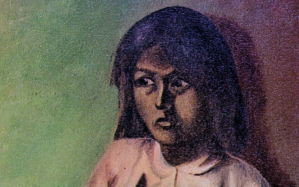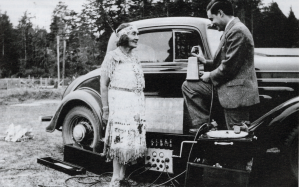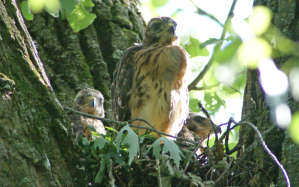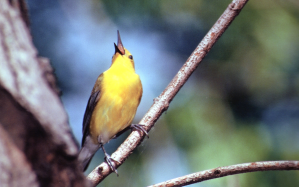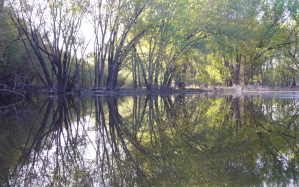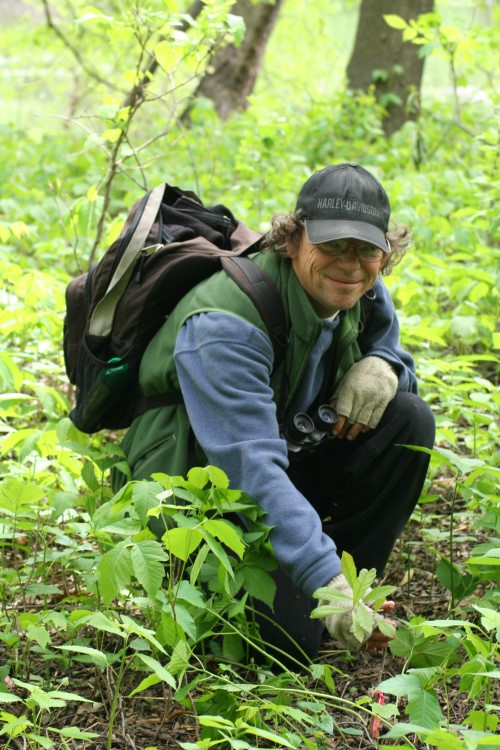INJUN JOE AND PRINCESS WENONAH
(Copyright 2017 by Richie Swanson)
Originally published in Thirty-First Bird Review Summer 2010
Inside McDougal’s cave
Crane gnawed at the skin of a dead bat, sucked the bones and fur, and Tom and Huck shouted outside the door, and Crane did not know if the boys were real, beguiling him, or if they merely screamed inside his head, haunting the madness he suffered—endless darkness and cold, aching hunger.
“Murderin’ half-breed!”
“Injun devil!”
“Sold himself to Satan!”
Crane groped for the stone he used as a cup, waiting for a water-drop to drip from a stalactite, and the drop refused to hurry. The drop had been falling only once every three minutes for eons—when the Effigy Mounds were new; when the foundations of Cahokia were laid; when Crane’s people battled French and Iroquois along the St. Lawrence; when the Sac lived along the Rock River; when the massacre at Bad Axe was “news.” The drop plinked now into his cup, and he drank and crawled to the door and struck the oak with his bowie-knife. The blade rang weakly, the boys laughed, and Crane decided they were only white lies, not real, and the locks tumbled clanging from the door. The door’s seal–boiler iron–fell, and Crane stepped out into the predawn dark, hearing a rumble above the river like buffalo stampeding, steam-boilers about to explode: a flock of wild doves came like a giant bearskin pulled across the sky, blotting the morning star and crescent moon, turning the dawn as black as the cave.
The pigeons who fed and nested in massive droves, easy to club and roast!
Whose oil had filled his mother’s baskets with cooking grease!
The butter from the squabs sweetening his mother’s bread and hickory nuts!
Crane snuck beneath the flock’s shadow down to the spring, smelling corn pone cooking, bacon, hog’s oil splattering. He crept down to the cooking fire outside Ole’ Jim’s cabin, and Ole’ Jim leapt from his pan. “Doan’ hurt me none—doan’! I `hain’t never done no harm to no ghost!”
Crane held out a yellow coin that had been buried beneath the cross of candle smoke in the cave. Jim fingered it, felt the gold solid. He brought Crane breeches, a shirt, shoes.
“By dogs, by cats, you goan’ be a n—–?” said Jim.
Crane rubbed charcoal and bear grease on his skin.
“You be off quick!” said Jim. “De Ivory Plume’s at St. Petersburg, en Mista’ Clemens’s on it, en he seen you rob `dat grave en stab Doc Robinson en put `dat knife in Muff Potter’s hands like Muff done it. Mista’ Clemens sees you out a’ de cave, he goan’ put you back in.” Jim stopped suddenly, dishing out pone. “Why, you `cain’t even go north! You gotta go west, stay off de Mississippi aw-together! Mista’ Clemens en another writer—Mista’ Longfellow—goan’ upriver, stopping at aw de towns, tellin’ stories. Mista’ Clemens goan’ to tell”–Jim gulped uneasily–“De Fate a’ Injun Joe en then `bout some princess from Life on de Mississippi, some Injun named Wenonah. And Mista’ Longfellow goan’ sing De Song a’ Hiawatha.” Jim looked up baffled. “Ever hear a’ Hiawatha?”
“Hiawatha’s Iroquois,” said Crane.
“`Dat tribe ever live anywheres near de river?”
“No.”
“Well, thousands a’ white folks a-wantin’ to hear `dem two talk. `En `dey aw callin’ de river up north de Valley a’ Hiawatha. `En `dey aw know from Mista’ Clemens what you done at de cemetery down here.”
* * *
Crane hastened along shore, and when the last of the pigeons rolled through the sky, the river gleamed suddenly gold, churning and pounding the bank as if to sweep away the boiler wood stacked on the bottoms of Cyrus Gates’ farm. Crane sat low against a tree, feeling himself free. Years ago the whites had forbidden his father Fisher from hunting along any river above St. Petersburg, and later they had told Crane no Black Hawk Indian could dig galena from the tribe’s old ground, that he must live on the reservation in Kansas, nowhere on the Mississippi. Yet here he was at the end of sugar-making time on the river, the maple sap petering out, and as he watched Cyrus Gates pile his logs into a rank, the Delta Jones pulled up, and her second mate came onshore and measured the wood with his rod.
“It’s twenty cords, sixty dollars,” said Gates. “All upland oak. Sixty dollars.”
Crane jumped to the pile and pulled out lowland cottonwood. He pulled out green-cut hickory and unburnable elm. He hastened up the gangplank and handed a box-elder log to Captain Ames, a pointy-chinned Yankee in double-breasted broadcloth, his ascot tied Illinois-style.
Crane hung his head before Captain Ames, “I jes’ `spected de wood for de Northern Queen aw de way from St. Paul to St. Petersburg.”
“Who owns you?” asked Captain Ames.
“No one, I swear on de Bible. I know aw de rapids on de river and aw de islands where doves nest and huckleberries grow for de ladies’ favorite pies.”
“I pay darkies five bits a day and scraps from the grub-pile,” said Captain Ames.
He ordered Crane up to the galley, and so Crane climbed to the boiler deck, and Spotted Hawk and three other Dakota braves stood chained to stanchions, dressed in filthy-holey blankets! The old war chief glared fierce at Crane’s hawk-nose, at the high arc of his Sac brow, and then the chief’s eyes dimmed defeated, and Crane walked briskly by, seeing Spotted Hawk many years younger, aiming a U.S. Army rifle, standing beside bluecoats, shooting at Sac scrambling through brush, over fallen logs, through sloughs.
The steward pointed Crane to an un-skinned sow in the kitchen, and Crane slit open the pig, wanting the chief’s scalp—Whirling Song had led Crane busting through willows that day at Bad Axe—they had run from musket-pops, and she—his mother–had fallen upon him, shielding him, and then her hair swept him bloodily, and Spotted Hawk threw her aside, and a bluecoat grabbed Crane’s feet, and Spotted Hawk, his hair. Crane’s head snapped, his world went dark, and he woke beside a pile of bones–a white doctor kneeling above little Yellow Crown, the girl biting a stick as the doctor sawed her arm at her shoulder, her elbow scarlet pulp, her hand mangled shreds.
* * *
Crane finished butchering the sow, and he wondered if Spotted Hawk and his braves had been jailed St. Louis, or if they had finally slapped their treaties across the generals’ faces, or if they had robbed a trader or had killed some white woman or what.
Crane carried out the slop bucket, and Spotted Hawk and his braves raised heads, begging, and Crane flung the bones overboard and strutted back in.
“N—–, wait!”
A barrel-chested man stood in the galley’s doorway, cow-eyes bulging moistly behind fine-rimmed spectacles, his head as bald as a river pearl. “I’m Doctor Thaddeus Lafayette, phrenologist.” He stared at Crane’s brow. “I’ve never seen such a head on a n—–, certainly not such a large lobe of reason.”
The Delta Jones slowed, the bell rang. Doctor Lafayette lifted his satchel reluctantly. “I’ll give you a free measurement, you get off here.”
Crane stood dry-mouthed, and Captain Ames poked his head beside Doctor Lafayette, “St. Petersburg! Name the wood sellers!”
A herd of passengers rattled the deck, pushing past Doctor Lafayette, “Twain! Longfellow!”
Doctor Lafayette gave Crane a final studious gawk, swung heavily into the throng, and Crane followed slowly, finding the Dakota gone from their stanchions!
Crane joined Captain Ames at the rail–whites packed the landing as tightly as logs in a raft, and guards prodded Spotted Hawk with bayonets down on the gangplank, hurrying him to shore. His braves followed in chains, bluecoats waited at a wagon, and a stone flew. The chief’s head snapped. Another stone came. A brave’s shoulder flinched.
War whoops shrieked high—white boys wearing feather-bands danced atop grain sacks and shipping barrels—a little blond girl with blue-ribbon pig-tails handed up a picnic basket—the boys reached beneath the checkered napkin, grabbed more missiles. The Dakota climbed into the wagon’s bed, and the boys hurled eggs, stones, balls of mud.
Everyone whooped. Hats flew high, and all the whites turned to the steamboat tied beside the Delta Jones, the Ivory Plume. The shaggy-mien poet tipped a tall silk hat from her texas deck, and the billowy-haired Clemens raised a pipe as voluptuously curved as a water moccasin.
Crane went into the galley. He rinsed the sow-meat, and the river-water reddened in the tub, and he knew the Dakota would someday be like the Sac who had lost so many bleeding in the muddy current—they would be crammed into train cars and ordered across the old buffalo prairie—would be put away in some country with little rain, little trees, only sand to grow crops—then moved again and again.
* * *
The Delta Jones churned for days against a swelling flood, and Crane worked with a crew who sang to the white god, and he hummed along, loathing the hymns, the towns and mills, the bundles of papers announcing new white settlements as far as the land went west.
The Delta Jones approached the Rock River, and a new soldier fort towered atop an island of yellow cliffs, and could it be true? Sandhill cranes called and echoed toward the field where Whirling Song had sat big-bellied and spread-legged on a scaffold, waiting with a musket to shoo hungry doves from corn shoots. The field where the pangs had seized her, and she clutched a pole, writhing. The sandhills bugled in the field, flung open wings, bowed. They leapt, tossing leaf-bits, twirling and bouncing, and Whirling Song collapsed, panting, and she had bucked, had yelled and cut Crane’s cord.
Captain Ames took on passengers at the fort. He loaded a gift for his wife, a surrey, and Crane tied the wagon to the roof behind the pilothouse, the roof jostling him, the engine thundering and vibrating, the stacks spewing sparks. The Delta Jones pulled back into the current, and the yellow cliffs came close—the ledge where Crane had sat as a boy, memorizing flags of steamboats, paddle-box pictures, the color of soldier coats to tell Fisher—and where once Crane had peered down through dawn-fog, hearing splashes, and soldiers had landed a keelboat, and Fisher had leapt aboard, smashing his axe against barrels, spilling salt pork, corn meal, gun powder.
Bluecoats drew pistols, and Fisher had tossed a steel trap and moneybag at their feet. “The Sac do not want these things!” Fisher had cried. “They cannot buy our land!”
The Delta Jones left behind the yellow cliffs, and a view of the Rock River opened east. A horse-team pulled a plough through rich black soil, moving toward a clapboard house, and Crane saw instead rows of lodges like longhouses, the grand village called Saukenuk, an open square, and older boys dancing the crane dance. Medicine sticks drummed and purred, and Fisher laid his woodpecker headband beside a swallow skin upon an otter-fur bundle, tied the bundle and dipped it into cedar-smoke, his eyes reverent for the ivory bill from downriver, the swallow who darted too fast for bullets, buffalo horns and armbands, red-clay paint, cane whistles, the rising sun.
Crane stayed stubbornly on board the Delta Jones. He gauged wood at Savanna, the old Sac mine sites, Fort Crawford. He shoveled fire clay around the steam stacks, and a narrow crack of a valley appeared in palisades, just a creek-sized river, Bad Axe. The river-cliffs dropped sheer, and Crane saw again bluecoats racing down, firing muskets. Whirling Song had grunted, thrusting a broken gun barrel into mud, digging Crane a hole, and then grapeshot ripped tree-crowns, the army firing cannons from its steamboat. Crane and Whirling Song busted through willow, and whites galloped past, shooting at an island–at Fisher’s war pony, then at an oak, and Fisher fell, his face painted red and black, his body floating in bloody water.
Crane looked across the whole broad sweep of river where Sac had dove, zigzagged, thrashed and fallen from white guns. He looked hard at the oak and island: sand was showing, shells shining. Crane yelled to the pilothouse, “Turtles! Soup!”
Captain Ames ordered Crane out in the scow to the island, and Crane rowed with oarsmen and then crept ashore toward soft-shells basking on a bar, and his feet stopped: a dead muskrat lay against tree roots.
No, an otter skin! Beads stitched on its paws! And an ivory-colored bill lay inside, a squirrel-skin of paint, pulverized feathers, a swallow-bill and claws, tufts of buffalo manes, eagle and hawk bills, a bundle of war whistles tied with fisher-skin strings!
He slung the medicine bag beneath his kitchen tunic, and he felt the fur oily and cool against his skin, his chest swell warmly, his temper drop as steadily as the Mississippi.
Fifty miles upriver from Bad Axe: Lover’s Leap
Wenonah lay jolted in moonbeams beneath the cliff, aching on top of her father’s head and arms, her mother’s legs, and Longfellow sang verses in her ear. Clemens let go a long derisive chuckle, and she was not sure if their voices were real or part of her bruises and pain, of her madness of shivering and waiting, of rolling against her wedding flowers crushed and unpicked, Wapahasha and Blue Day dead.
“Her parents promised her to another?” said Longfellow.
“And singing her death dirge, she threw herself from the precipice,” said Clemens. “She dashed her parents in pieces and disappeared to some distant clime, the most pathetic of all the legends of the Mississippi.”
The moon passed through the milky trail of beaver bubbles, blurring the Northern Crown and evening star, and Wenonah wished it would set, and the sun would warm her, but the moon refused to hurry. The moon had traveled through the creator’s night-breath at the same pace for eons–when beads and necklaces were Old Copper; when gourd seeds were stored in clay pots; when Ojibwa with white guns drove her people from Spirit Lake; when her grandfather The Bear joined Tecumseh’s futile alliance; when Wapahasha’s band departed their village across the Mississippi.
“No one tells a Dakota tale like Longfellow,” said Clemens.
“From the full moon fell Nokomis,” sang Longfellow. “In the moonlight and starlight, Fair Nokomis bore a daughter, And she called her name Wenonah…And the daughter of Nokomis, Grew up like the prairie lilies.”
Wenonah groped for Blue Day and clutched bluestem and lupine.
“And the West Wind came at evening,” sang Longfellow. “Found the beautiful Wenonah, Lying there among the lilies, Wooed her with his words of sweetness.”
Wenonah spat roots and dirt.
“Till she bore a son in sorrow,” sang Longfellow. “Thus was born my Hiawatha, But the daughter of Nokomis, Hiawatha’s gentle mother, In her anguish died deserted, By the West-Wind, false and faithless.”
Wenonah wriggled. Her mother was Blue Day, a full-blood Mdewakantunwan, not Nokomis. Not Ojibwa.
The West Wind had never had Wenonah. She had no son or husband, had never been abandoned, had never leapt upon her parents.
Now a bat swooped above her—no, a night bird, flying after moths. It landed, rustling indigo, calling. Whip-poor-will! Whip-poor-will! Wenonah caught the beating pulse, shouting at Longfellow. Bag-of-wind! Bag-of-wind!
She shouted at Clemens. Bag-of-wind! Bag-of-wind!
Wenonah stood buoyantly, the white voices gone, the white glow down on the blue-black river the only remnant of the sunken moon.
Gray forms rose across the Mississippi—a year ago bark houses, the Dakota village Keoxa—now log cabins and warehouses, the settlement called Winona.
The town and river dimmed. Buffalo-hooves stampeded the sky, sounding like steam boilers about to explode. A flock of wild doves came from downriver, pulling a giant bearskin across the sky, and Winona hastened to her dugout hidden in a river-slough. She paddled away from gunshots, the doves shadowing her, pigeon-toms falling everywhere, ramrods banging into muskets, white men reloading.
Fumes of sulfur pots reeked in the bottoms. Torches flared inside island-woods, and white men in hoods and galoshes scurried between trunks, slinging passenger pigeons into sacks. Wings flapped desperately, hundreds of doves in nets.
Wenonah turned into a narrow channel, hugging the darkest curves, and when the shooting grew distant, and the sun winked through trees, a brave in a breechclout was bending on a bank in the smoke of burning cedar, the dawn-light buttercup-yellow on the hard-bronze muscle of his thighs, his hams lean and sinewy. Crane turned, holding his otter-skin bag, and Wenonah drew an arrow as if to wear his privates upon her headdress.
“I am about to sing,” said Crane.
She drew her arrow tighter, and snorts and grunts tore through leaf-litter, hogs loose in the bottoms. Wenonah released her shaft, and a pig fell squealing, spitting out a squab it had grubbed from the ground. Muskets popped, a white voice yelled from trees, “Thieves! You steal from my land, I’ll kill you!”
Crane snatched the hog and jumped into Wenonah’s dugout, and she paddled until sunlight blinded her–the bottoms suddenly without trees, only stumps, a saw mill roaring–more whites.
The two lay down quickly together and drifted a long time, their bodies pressed warmly, tightly together. Crane glared stonily at Wenonah, as if they might be shot, and it did not matter, he boiled so incurably inside.
The dugout bumped against a bank where the crowns of trees were slate-blue with doves, and hens clucked and fussed in branches as if no white hunters were near. Crane clubbed trunks, and squabs fell like apples. Wenonah lit a fire deep in a hole, dressed the chicks, and Crane laid a metal pot and tin of salt beside her. She eyed him searchingly.
“Yes, I stole them from the Ivory Plume.” Crane gripped his bowie-knife. “I hated working for whites, pretending, but I will blacken myself one last time. Clemens tells Injun Joe across the river tomorrow, and I will go on stage to polish his podium.”
“And Longfellow will sing Hiawatha?”
“Yes, why?”
Wenonah stared at the knife-edge.
“Do you know how to make squab butter?” said Crane.
“I know how to skim pork lard from a pail,” said Wenonah.
“My mother put squab butter on nuts,” said Crane. “And on corn and squash.”
“I can churn butter from cow’s milk,” said Wenonah.
“Your mother did not make squab butter? Your grandmother?” said Crane.
“I do not remember how.” Wenonah in her anguish hung her head.
“Ah-ha,” said Crane, “I would play you a swan-bone flute, but the preacher on the reservation broke it across my skull, and I did not learn.”
* * *
They ate pigeon-meat warm on their tongues, succulent like roasted quail, and they spent the afternoon between bearskins, rising from their embrace only to turn meat-strips on sticks and look out for whites. The doves quieted at dusk, and Wenonah slept holding Crane, feeling his heat still inside her, and she dreamt the face of a boy, Crane’s glare boiling, her long supple cheeks turning hard and hateful. The boy sat a desk, a teacher reciting. Till she bore a son in sorrow. The boy stood objecting, shivering as if very cold, and the teacher snarled, his teeth stallion-sized, and he snapped a quirt, and then the boy was down, kneeling above a cow pie, starving, picking out a corn kernel, and then he was old enough for a fast, a vision, and his ankle was shackled to a picket fence, he wore prison pants stained with icy mud, and a bluecoat walked past, drinking whiskey, and Injun Joe stared after the cup, thirsty and groveling, and a light descended, hissing brightly yellow, and Wenonah clutched Crane, and he woke ready again, and she shoved him off.
She dressed, packed the dugout, and they paddled through a slough where their strokes rippled silver, and the palisades rose sheer like Bad Axe, the cliffs moon-white. “I dreamt our boy inside me, a lantern blinding him,” she said.
She held her head high. They paddled to the steamboat channel and saw spangles of yellow light bouncing past the last cabins of Winona, the lantern climbing a pasture, moving steadily toward the hill where Dakota had once lain upon burial scaffolds, shells and bells tinkling, spirit flags waving.
Crane and Wenonah crossed the river, landed at a creek-mouth, painted their faces. They crept crawling to a dense-dark wall of darkness, a cemetery fence made of scaffold-poles. They lay peering through cracks, and Clemens sat on a handbarrow amid gravestones, smoking a cigar in moonlight, his eyes roaming anxiously. A spade scraped earth, clinked against wood, stopped. Longfellow turned, leaning upon a shovel’s handle, and Doctor Thaddeus Lafayette stepped beside him, wiping sweat from his face.
“Look here, what does this mean?” Clemens scowled at the two men who dared to delay. “You required your pay in advance, and I’ve paid you.”
“Well, hand me my calipers, and you’ll have the skull of your chief,” said Doctor Lafayette.
“If indeed he is The Bear; not my child of wonder; my child of sorrow, my Hiawatha,” sang Longfellow.
Clemens scoffed, rising with calipers, and Doctor Lafayette and Longfellow pried the coffin’s lid with spades. The three unrolled a Dakota robe, and the doctor laid a skull upon the grass, and he measured it in the lantern light, testing its depth against kings of England and pharaohs of Egypt.
“The Bear indeed.” Doctor Lafayette handed the skull to Clemens, and an owl screeched, caterwauled, and Clemens bolted toward the graveyard-gate, and there stood the pathetic legend, blood smeared across her cheeks, scalps, penises and testicles dangling from her headdress. Clemens whirled, smashing into Longfellow, and the two fell, the spade driven through Clemens’ chest, blood spilling out his spine. Longfellow straggled up, was tugged backward, Doctor Lafayette pressing a cloth over his mouth—chloroform! Doctor Lafayette eased Longfellow down dead and tossed wallets, a moneybag toward Crane. He slid The Bear’s skull from beneath Clemens, laid it gingerly back in the coffin, tapped the lid closed. The Indians had vanished. Doctor Lafayette spoke into darkness, the last places he had seen them. “You may think me wrong, but you can go now. You killed no one. Chance and my profession have done your work for you. You can go to your reservations, and no one will question or hang you. You need not speak of tonight, for you will only inspire a constable’s suspicions.” Doctor Lafayette shoveled dirt hastily back onto The Bear’s coffin, glanced at noises pattering beyond the fence. “You may find me cold-hearted, but by precise instruments and mathematical proof I know how closely the chief’s skull matches Longfellow’s. I know both were orators, slaves to their muses, and the skull of Clemens merely matches Iktomi your trickster’s. You may call me a thief, but if you have a child someday, and I can measure by the shape of his skull his strengths and deficiencies, his teachers will be able to better bend his disposition, and we will improve every child, every person—live at peace with all of mankind!”
Doctor Lafayette bent above Longfellow, cutting his forehead, and Crane and Wenonah watched eagerly from a knoll above the graveyard. Shrieks rose from the cut, and blue and white lights flashed above the opposite cliffs, sailing east—Hiawatha’s spirit.
Nokomis’ spirit rose released.
Minnehaha’s rose released.
Uncountable others rose released.
Doctor Lafayette neither looked nor heard. He knelt above Clemens, cutting into his brow, and flashes shot out, and Crane and Wenonah flew backward as from hurricane gusts, and they giggled, clutching each other.
Doctor Lafayette rolled the handcart out the gate, and Crane’s war whistle caught the beating pulse. Full-of-feces! Full-of-feces!
The doctor’s head shone turning, his spectacles glinted this way, that, and he fell across the cart, stumbled up, hoofed clumsily downhill, looked up at the cart, his sack of skulls discarded on the ground, the war whistle still beating: Full-of-feces! Full-of-feces!
Doctor Lafayette flew toward cabins, town, and Crane and Wenonah went down to the white shovels. They tossed dirt high, flung it past the fences. They carried The Bear’s coffin to the dugout and pulled the dugout by ropes up the river pearly-dark, pewter-blue, sparkling moon-diamonds. They buried the coffin deep in a dark ravine, and they crept up to a grove of jack oaks, their moccasins crunching acorn husks left by doves. They lay between bearskins, and the river valley yawned vacantly, no steamboat rumbling below, no deck torches in the dark, and Wenonah sank against Crane’s shoulder, and he glared up at her beaver bubbles, his Milky Road, the Sac path to the land of the dead.
Whirling Song’s spirit remained trapped beneath Spotted Hawk’s scalp.
Fisher’s spirit remained trapped beneath a bluecoat’s scalp.
Crane tasted foul fur, waited for a miserable drop. He flinched. He hardened. He reached, and Wenonah assuaged him with oil richer, sweeter, warmer, smoother, more ancient than squab butter.

